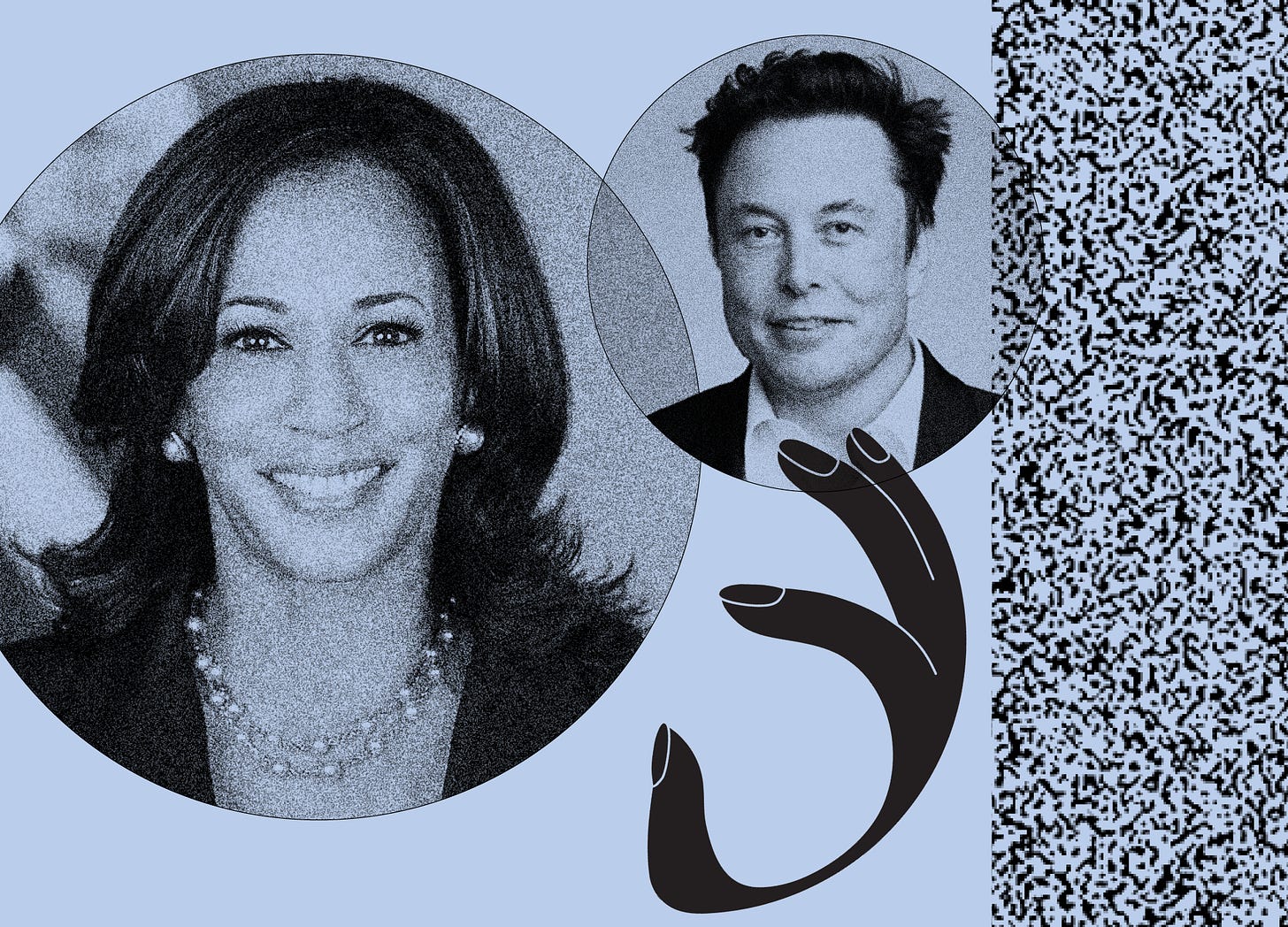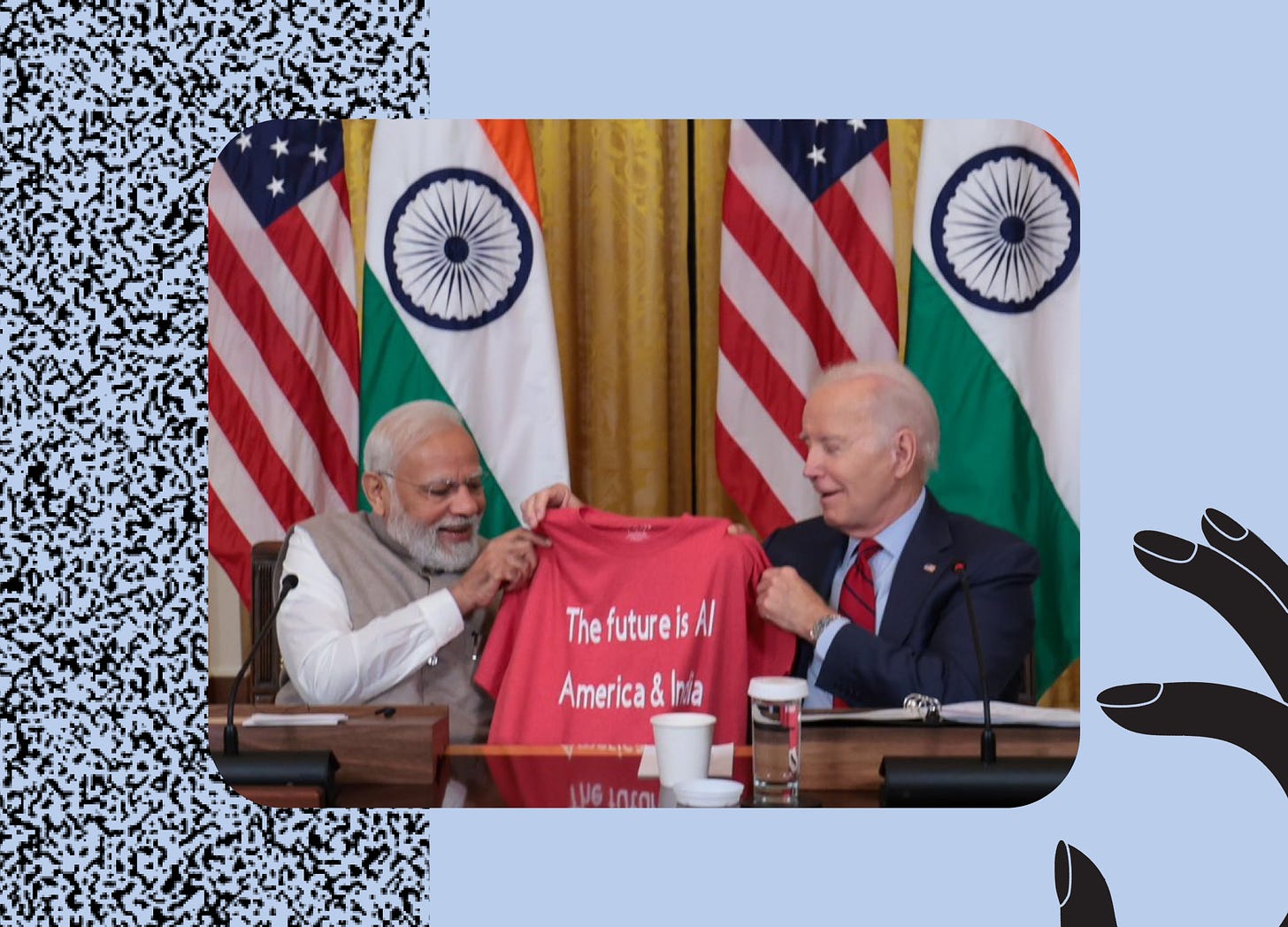The political media revolution is entering its 'shitposting' era
And deepfake regulations are kinda fake too
In an apparent violation of his own policies, Elon Musk recently shared an AI generated parody campaign video of U.S. Presidential candidate Kamala Harris on his platform, X. Because when you own the sandbox, you can do whatever you want in it. The video was a repost from source account @MrReaganUSA, where it was described it as "ad parody", a disclaimer that did not appear on Musk’s repost. While the video footage of the post is authentic, the voiceover is deepfake mimicry of Harris saying obviously negative claims about herself, and of her predecessor Joe Biden:
I may not know the first thing about running the country, but remember, that’s a good thing if you’re a deep state puppet. I had four years under the tutelage of the ultimate deep state puppet, a wonderful mentor, Joe Biden.
It’s clear by seeing Musk’s post in context with his other posts on X, he does not support Harris and is using his platform to detract voters from electing her. At the time of this writing, Musk’s post has garnered 132.6 million views, over 10 times the original video’s 22.4 million views. By sharing the post on X, he’s made a deepfake video go viral. The obvious effect is that he’s shared a negative sentiment of Harris which in itself is not inappropriate. Public figures being vocal about candidates they endorse or oppose is part and parcel to campaign antics. The more pervasive and sinister issue at play is that Musk widely disseminated a deepfake and without labeling it as such, normalizing and perpetuating its legitimacy in public political discourse. I’m not saying he’s attempted to misidentify it as authentic—I don’t think anyone with two brain cells to rub together could construe that video as real—but he’s circulated a deepfake as a valid medium for criticizing a candidate which is wholly new in U.S. presidential politics.
The use of AI in elections is not new to India, which was awash in deepfake videos during their general election last spring. While many American news outlets reported AI use in the Indian election was a net positive in that rather than be used deceptively it strove to better connect with voters by bolstering candidates’ messaging, some Indian reports warn that abuse of the technology can increase incidents of misinformation online. For India, AI is necessary a companion to American allegiance. The two are fundamentally intertwined as stated by Narendra Modi, the incumbent Prime Minister of India, who secured a third consecutive term in the 2024 general election and famously said: “The Future is AI, American and India. Shortly after his win, Modi took to X to praise AI and its alliance with America, accompanied by a photograph of American President Joe Biden presenting Modi with a t-shirt printed with his famous quote, where he was flanked by the CEOs of American tech giants Microsoft, Google, Apple and OpenAI:
AI is the future, be it Artificial Intelligence or America-India! Our nations are stronger together, our planet is better when we work in collaboration.
While regulators in America haven’t sought to ban deepfakes entirely, they are working to ensure they are labeled appropriately, so viewers know they are watching an AI generated video. There is general consensus and fear that deepfakes are becoming a major factor in politics this year, as the technology used to create them becomes more readily available, and simple for anyone to use, creating believable audio and video of presidential candidates and their supposed detractors or supporters.
In 2020, Facebook banned deepfakes on its platform, but allowed a loophole in that parody and satire are allowable forms of deepfake. This consideration of nuance means that depending on the intent of usage, deepfakes are a valid form of communication. So long as they are not intended to fundamentally deceive, using a deepfake to convey a message is allowed. Paired with Meta’s more recent Made with AI label in Instagram and Facebook posts, one could deduce they are self-regulating to create an internal ecosystem of AI generated content accountability.
Over at YouTube which is owned by Meta’s competitor, Google, you can now request that AI generated videos that use your likeness be removed from their platform. It’s a far-cry from big tech companies self-policing the content they host, as policies like this still require that requests for removal be sent after content has already circulated, rather than rooting out non-consensual deepfakes before they are uploaded.
My grain of thought
Negative sentiment like Musk’s in the form of social commentary, political satire, and editorial cartoons are not new, and in fact, discourse like that forms the framework of freedom of speech. News media has long relied on political caricatures to effectively and widely conceptualize complex topics for mass consumption. But as the public gets acquainted with and desensitized to deepfakes that are extremely easy for anyone to produce and distribute directly onto social media, we risk a flooded media landscape rife with various degrees of credible messaging, from sources we can’t confirm, with intentions we can’t assume. What results is fertile ground for a post-deepfake genre in the political field, aptly named, the Shitpost. These outrageously false, crude and somewhat nonsensical claims are disseminated to derail valid constructive dialogue about a candidate. A recent shitpost circulated about Republican Vice Presidential candidate JD Vance writing about having sex with a couch in his memoire, Hillbilly Elegy. The outlandish and fake claim which is easily debunked with a modicum of research circulated widely on social media, major news outlets, and even landing as punchlines on national television shows of Stephen Colbert and John Oliver. Shitposts become pervasive when an audience becomes disillusioned and mistrustful of mainstream media, and in turn becomes desensitized to fake content flooding their social media feeds like X and Facebook, where now more than half of audiences are accustomed to getting their news fix. The evolution from deepfakes to shitposts fosters a world that embraces both, which can be used in conjunction to create an admittedly dystopian view on how we communicate and what we believe.
The tech giants are fostering and enabling a climate that perpetuates this content, offering self-regulation that amounts to a drop in the bucket compared to what’s needed to control it. But my question is: Is there an obligation to control deepfakes and shitposts, or are they a natural progression of humanity’s collective interest? This phenomenon follows a historical trend of emaciating news media and fattening social media, leading to audiences hungry for bite-sized content that is easily consumed and shared. Who are governments and regulators to hold back a wave decades in the making and now culminating in a logical progression? What are they trying to cling to, and are they sure they can succeed in getting it back? If we are in the throes of a media revolution—which I believe we are, beginning with the advent of digital content and the internet in the mid-1980s—there is no credible turning back. We must boldly face forward, take stock of the values and principles we wish to maintain, and carry them squarely into a new media landscape.






